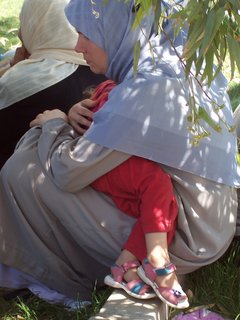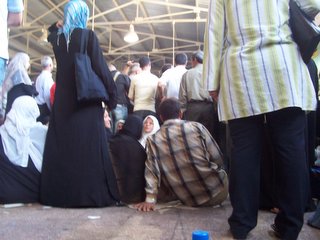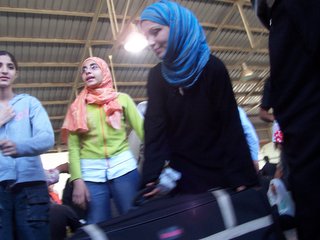



Living in Gaza is difficult, but coming to Gaza is even more difficult. Al Maabar, the Border, is an Arabic word that makes Gazans shiver. Me and my husband visited Gaza in 1999, so I already had a bad experience in the back of my mind when we arrived to Rafah. However, that experience would prove to be pleasant comparing to what was expecting us. This time we arrived with three small children and 8 bags in a politically very unstable time, the end of June 2005. It was already afternoon when we entered the border. We were met by a hall full of people and was told that the border had not yet opened that day. The first thing you have to do is get a visa from the Egyptian check point. In the middle of the hall is a little room in which the Egyptians sit and write on papers and applications, the tables are full with files and folders and there is not a single computer as far as your eyes reach. There is a long queue in front of the little window to the little room and once you’ve managed to leave your passport in their hands you have to wait… and wait and wait until your patience is all gone. Then you will confront them and ask what’s taking so long with your passport. That procedure is repeated about five till six times until you finally have your passport again with their stamp in it. Then you have to wait for the bus that is going to take you to the Israeli check point. Having European passports we were escorted trough the crowd that since the morning was waiting for the bus. A woman started shouting on us and my husband answered her that this is how the Arabs treat the Arabs. Our bags were stuffed into the bus. Then we sat outside under a tree and waited. It was hot and my children were tired and hungry. When the evening came they finally said that the Israeli check point wont open today, so we had to wait until tomorrow. The young woman sitting beside with a baby and a young son said “I will die if it’s like that!”. For the carriers of Palestinian passports (which was about 99% of the people) it meant spending the night at the check point. Due to our Swedish passports we managed to have our names written in a little notebook kept at the gate after canceling our visa, a process that took us many hours. At night we were finally able to come out and took a taxi back to the nearby city of Al Arish.
The next morning we woke up early and arrived at the Border at 07.00. This time the hall was more full than the day before. People sleeping on the stone floor, old people sitting on their bags, children crying. Now we had to renew our visa, a process of a few hours. Again we had to be escorted trough the crowd which was almost impossible due to all the people and their bags in front of the exit (to the buses). Again we sat under the tree. That day we had been able to bring some food with us. We had bought a bag of dates that we passed around to the people sitting beside us. We made friends with a Palestinian couple from Canada. My children slept in the grass. Sometimes they told us that the Israeli check point had opened and we better sit in the bus, but after sitting there a while we returned to sitting under the tree again. When evening arrived we realized that we wouldn’t cross the border even that day. Again we canceled our visa. Again we returned to Al Arish, this time in the company of our Canadian friends. That evening my children actually swam in the hotel pool (a great contrast to the chaos of Rafah) and my husband went out to buy them some new clothes (all our belongings were still inside the bus in Rafah) and we ate watermelon watching the sunset by the beach.
The next morning, after a hotel breakfast, we headed for the place of chaos again. This time we were met by a queue outside the border hall. Outside the gates was a large group of people, men, woman and children and their bags. They were all angry and frustrated. We managed to reach an Egyptian guard and explained to him that our names was in the little notebook, that our bags was already inside the bus and that we should be let in before these people because of that. The entrance was of course covered by the crowd so after some begging I was allowed by an Egyptian officer to let my oldest son and my youngest daughter and myself crawl under the fence. My husband however wasn’t allowed any shortcuts (however red his Swedish passport is, he is after all still an Arab) and our Canadian friend said to me “Leave one child in the hands of your husband otherwise they will never care to let him pass”. So my husband began to “climb” over the people who pushed him back. My daughter (who is only three) got scared and started to cry. I cried from the other side of the fence, tried to call out to her that everything would be ok. I begged the officer to try to help my husband but he pretended he didn’t hear me even though I pulled his clothes. When he finally arrived at the entrance the other Egyptian officers pushed him back and I started screaming that he was with me. At that point my husband also lost his temper and said a few well chosen words, something he could get away with due to our red coloured passports. Our Canadian friends also climbed trough the crowd following my husband. Somewhat chocked we could now continue to the hall, and of course it was more full than yesterday. Another visa process. By then the officers knew me by name, although that unfortunately didn’t speed up the process very much. Being escorted trough the crowd that day was horrible. The crowd started moving, some people fell and children and women were crying. Men were shouting. The pressure eventually became so heavy that the guards had to let them out. I shouted on the guards “How can you treat them this way? Are they animals?”. But they didn’t even look at me. Again we sat under the tree. Waited and waited.
Then the rumour spread. The Israeli check point was open! We took place in the bus. First I sat in a seat with another woman and my children, but as the bus filled up we were eventually five grown up women and my three children in one seat (which holds two sit places). After we had squeezed in ourselves far past our limit the somewhat sadistic buss driver said with a little smile on his face “And now the men will come on as well!”. Jippididoda. I cannot really estimate how many we actually were on that bus, but I can tell you that there was no air condition or even fan, my children almost fainted, my youngest 2-year old had a panic attack and screamed and screamed, my leg was pressed against the back of the chair in front of me (the pain lasted for almost a week) and soon even I started to feel faint. My stomach turned inside out, my whole body became cold, tears started to fall down my face. As a miracle my husband ended up just in front of my chair so he could lift up our daughter and put her on the top of the chair. Some other woman tried to hold her to calm her down, but she kept on screaming.
The passage that this bus is supposed to take us trough is approximately 200 m, between the Egyptian check point and the Israeli check point. After having clearance to pass, the bus started out but was stopped in the middle. Our bus stood still for close to an hour. I really don’t know how we survived that. But what choice did we have? And I really cannot find any other explanation for us being stopped than that the Israeli side prefers to make the Palestinian life really difficult. In that situation a man standing beside me actually made a clever joke, saying; “Ey balad hadhi?” Which country are we in?
Finally we arrived, shaking and crying. On the Israeli side we with non-Palestinian passports were the last ones to leave. One woman traveling alone was sent back, because of id-reasons, but in the end they let her pass. We reached Gaza Strip and our family that we hadn’t seen for six years was waiting for us.


1 comment:
Jazzakh Allah khairun for your honest description of what it's like to cross the border. I have often heard how bad it is, but your writing gave an excellent first-hand report. May Allah reward you for being in Gaza, amin, and keep you strong in your iman and hope.
Post a Comment